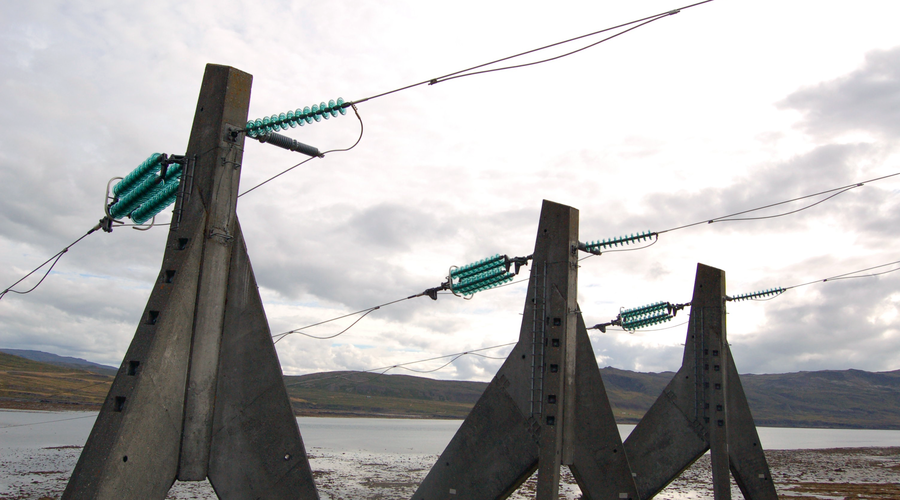MSc Electric Power Management
A highly adaptable, interdisciplinary programme based on practical experience and fieldwork, this master's programme combines economics, technology, engineering, and science into one comprehensive degree. This degree is designed for a diverse student group with quantitative backgrounds interested in an the study of data science and the power sector from a non-engineering perspective.
The M.Sc. in Electric Power Management requires 24 months of continuous study and the completion of 120 ECTS. A personalized study plan is developed for each student with the assistance of an academic supervisor.
Overview

Language: English
Duration: 24 months of continuous study.
Format: Full-time, on-campus.
Start: Late July
Despite the recent increase in computing power and access to data over the last couple of decades, our ability to use the data within the decision making process is either too often lost or not maximized at all. We at times don't have a solid understanding of the questions being asked nor how to apply the data correctly to the problem at hand. This program is designed to present the methodology that can be used with data science, to ensure that the data used in problem solving is relevant and properly manipulated to address the questions at hand.
Electric Power Management is concerned with the major steps involved with both tackling a data science problem and in practicing data science, from forming a concrete business or research problem, to collecting and analysing data, to building a model and understanding the feedback after model deployment. Additionally, the program is concerned with design requirements for electric power systems and subsystems, and their interactions. We focus on creating graduates with the skill-sets necessary to join this high-demand industry.
The Iceland School of Energy offers a variety of courses, designed for specialization in data science and electric power systems, including Power System Operation, High Voltage Engineering, Smart Grids and Sustainable Energy Systems, Power System Stability and Control, Power System Protection and Power Electronics. A highly adaptable programme based on practical and fieldwork experience, this master's programme combines economics, technology, engineering and science into one comprehensive degree.
Collaboration – Inside Access
In collaboration with our partners, including global leaders in renewable energy like Reykjavik Energy and Iceland Geosurvey, students are offered unparalleled insights into the entire sustainable energy spectrum.The Electric Power Engineering and Management M.Sc. programs are operated in collaboration with Landsnet, the Icelandic Transmission System Operator (TSO). This collaboration gives our students exceptional access to:
- Renewable energy systems and associated data in Iceland
- Professionals at the forefront of developing and operating renewable energy resources
Student Body and Faculty
The Sustainable Energy Science program attracts a diverse cohort of students, with backgrounds spanning from business and engineering to social sciences and natural sciences. While students from disciplines such as Business, Engineering, Economics, Geology, and Geography often find the curriculum especially enriching, our doors are open to passionate learners from all academic realms. This rich tapestry of backgrounds fosters a unique interdisciplinary environment, enriched further by our faculty— a blend of seasoned academics and industry professionals. Together, they ensure a holistic and practical understanding of sustainable energy challenges.
The program aims to equip students with the ability to apply sustainable energy concepts and quantitative methods to real-world challenges. Students will gain insights into the significance of a holistic approach, understanding the interplay between technology, economics, and policy-making. Moreover, with the looming challenge of climate change, the principles and tools of sustainable energy are indispensable in crafting global solutions.
Join us in this journey as we explore the vast discipline of sustainable energy, delve into its complexities, and emerge with knowledge and skills that not only promise a sustainable future but also pave the way for innovative solutions in the field of energy.
Program Structure
Duration and Format
- Duration: 24 months of continuous study.
- Format: Full-time, on-campus.
- Credits: 120 ECTS
Pathways to Specialization:
- Engineering: This track emphasizes the technical aspects of electric power systems, equipping students with the skills to design, develop, and manage modern power systems. The curriculum covers high voltage engineering, smart grids, power system simulation, and more. Graduates can pursue roles such as power systems engineer, analyst, or high voltage engineer.
- Management: This track combines technical and social aspects of electric power and energy systems. Students develop expertise in engineering principles, economics, and power systems engineering. This prepares them for diverse roles including project managers, energy analysts, and utility managers, where they can contribute to the efficient management of power systems and operations.
While these pathways provide a structured approach, they are by no means restrictive. We encourage our students to traverse between them, ensuring a holistic understanding and fostering interdisciplinary exploration.
Teaching and Learning
Our curriculum is a blend of traditional lectures, seminars, and field visits, ensuring a comprehensive understanding of the subject matter here at Reykjavik University. What truly sets us apart is our faculty, comprising both accomplished academics and industry experts, bringing a wealth of knowledge and real-world insights to the classroom.
Personal Study Plan
Addressing energy challenges requires a collective effort, drawing insights and expertise from every corner of academia and industry. At the Iceland School of Energy, we believe in the power of diverse backgrounds coming together to forge innovative solutions. We collaborate across the university and various disciplines, tailoring study plans to ensure every student remains engaged, inspired, and constantly challenged.
Programme Schedule
Summer Year 1
End of July - Beginning of August (3 weeks)
Required ECTS: 6
- Energy Field School (6 ECTS) - SE-801-ES1
Fall Year 1
August - December
Recommended ECTS: 24
- Energy Economics (6 ECTS) - SE-805-EC1
- Power Systems Operation (8 ECTS)** - T-867-POSY
- Electives in Renewable Energy from ISE
- Electives from Reykjavik University graduate course catalog (subject to ISE approval)
Spring Year 1
January - June
Recommended ECTS: 30
- Smart-Grids in Sustainable Energy Systems (8 ECTS)
- Stability and Control in Electric Power Systems (8 ECTS)
- Research Methods (4 ECTS)** - T-801-RESM
- ISE Independent Project (6 ECTS)
- Electives in Renewable Energy from ISE
- Electives from Reykjavik University graduate course catalog (subject to ISE approval)
Fall/Spring Year 2
August- June
Minimum Required ECTS: 60
- M.Sc. Thesis Project (60 ECTS)** - T-900-MEIS
Core Courses and Electives
Energy Field School (6 ECTS)
A three week, intensive course that provides students with an overview of power systems engineering, the main issues that require change in the transmission and distribution of electricity and the factors that may impede or promote meeting that demand. The course is delivered through a combination of lectures and site visits, and students have opportunity to see working systems that utilize sustainable energy. The course is taught as a summer school, also open to other participants and offers a unique introduction to the master's program.
Power Systems Operation (8 ECTS)
12-week course designed to provide students with a working knowledge of power system problems in both balanced and unbalanced operation situation including faults, protection principles, energy management methods and computer techniques used to solve some of these problems. The transmission line transient operation and insulation coordination is also part of the course.
Topics include: Symmetrical components, Modelling of transformers, lines and cables in the positive, negative and zero sequences based on physical models, The impact of different earthing principles, Methods for power system analysis in steady state operation and during grid faults, Faulty system operation, balanced and unbalanced faults, Symmetrical components and unbalanced fault analysis, Basic protective methods and principles, Load flow calculations in steady-state power system analysis,Model complex power system operation issues for economic and secure operation, Load flow calculations in steady-state power system analysis, Model complex power system operation issues for economic and secure operation, Principles for regular power flow and optimal power flow methods, Power system operation principles and basic functions in energy management system. Optimization techniques to solve fundamental operation problems, N -1 steady state contingency analysis, Transmission lines Transient operation, Insulation coordination, Power system state estimation and the incorporation with phasor measurement units; (Smart Grids). Practical assignments solved in the numerical simulation program Power World.
Smart Grids and Sustainable Power Systems (8 ECTS)
12-week introduction to electric power systems and smart grids.
Key topics covered: energy resources and power plants, smart grids control and automation, information and communications technologies (ICT) applications for smart grids, renewable energy and emerging technologies, stability analysis for smart grids, power electronics and high voltage direct current (HVDC) transmission in smart grids, and case-studies, experiences, test cases, or a project in smart grids.
Stability and Control in Electric Power Systems (8 ECTS)
12-week course designed to help obtain knowledge about conditions in electric power systems that can lead to stability problems, to understand which physical mechanisms are the cause of power system instability, and to give the student insight in the theoretical background for analysis methods used for assessment of system stability.
Hands-on experience will be obtained by carrying out numerical simulations and analysis in MatLab/Python, where students analyse different stability problems implementing and applying appropriate models and methods for analysis.
Main learning objectives: explain the principal causes of power system stability problems (frequency, transient rotor angle, small-signal rotor angle and voltage stability problems), reflect on how power system stability problems are affected by grid-related limitation for the transfer of active power and the machine-related limitation for the injection of active and reactive power.
Elective Modules
Students have access to a wide variety of elective module to tailor their curriculum to suit their focus. Elective courses include for example:
- Partial Differential Equations
- Datamining and Machine Learning
- Project Management and Strategic Planning
- Simulation
- Advanced Circuit Design
- Theory of Computation
- Measurements and Stochastic Variables
- Linear Dynamical Systems
- Energy Economics
- International and European Energy Law
- Probability and Stochastic Processes
- Engineering Optimization
- Economics of Energy Markets
>> More information on all available courses can be obtained from the course overview page.
Study Abroad & Exchange
 Students from the Iceland School of Energy during their year exchange as part of the dual degree between Reykjavik University and Aalto University Finland focused on electric power and automation.
Students from the Iceland School of Energy during their year exchange as part of the dual degree between Reykjavik University and Aalto University Finland focused on electric power and automation.
At the Iceland School of Energy, we believe in the power of global perspectives. That's why we've established partnerships with renowned universities across Europe and beyond, enabling our students to embark on programs ranging from a few days to a semester or two.
Typically, students opt for these exchange opportunities in their second year or later. This timing allows them to align their overseas studies with their thesis research, delving deeper into specialized topics and benefiting from the expertise available at our partner institutions.
For many of our students, who hail from various corners of the world, these program offers an enriching chance to diversify their academic journey. Our partner institutions are spread across countries including Austria, France, Germany, Italy, Slovenia, the Netherlands, Romania, Colombia, Mexico, and Indonesia, offering a myriad of learning environments and cultural experiences.
Benefits of our exchange programs include:
- Gaining a broader understanding of the global energy landscape.
- Immersing in diverse teaching methodologies and cultural nuances.
- Collaborative opportunities, such as co-authoring thesis topics with faculty from partner universities.
- Specializing further in specific areas of interest, enhancing employability and industry readiness.
In essence, our exchange programs are more than just academic adventures; they're pathways to global understanding, fostering well-rounded professionals ready to make impactful contributions in the energy sector.
Admission
Admission Requirements
The Electric Power Management program is tailored for candidates holding an undergraduate degree from diverse academic backgrounds, fostering a multidisciplinary environment. A foundational understanding of power systems and circuit analysis is advisable. Additionally, proficiency in coding, statistics, and mathematics enhances the preparation for this program.
Beneficial Undergraduate Degrees
Having an undergraduate degree in one of the following disciplines will be beneficial:
- Electrical Engineering
- Power Systems Engineering
- Mechatronics Engineering
- Computer Engineering
- Physics
- Mathematics
- Computer Science
- Economics
For further details regarding admission requirements and the application process, please visit our Admissions page for the Iceland School of Energy at: Admissions Page
Recommend GPA
The recommended grade point average (GPA) for admission is 8 out of 10 on the Icelandic selected grade point scale, which is equivalent to a GPA of 3.25 out of 4 on the U.S. scale.
Contact us
Have a question about the degree?
You can reach out to us any day by simply sending us an email at ise@ru.is.
| Photo | Name | Title | Contact | Description |
|---|---|---|---|---|
 | Jacob Kaminski | Program Administrator | ise@ru.is | Prospective students may reach out for questions regarding any of our graduate programmes. |
 | Ragnar Kristjánsson | Assistant Professor | ragnark@ru.is | Contact for questions regarding the content, structure of the graduate programme, and other inquires about it. |
| Freyja Ingadóttir | International Admissions Officer | admissions@ru.is | Contact for general questions regarding the application process, visa-related issues and inquires. |

